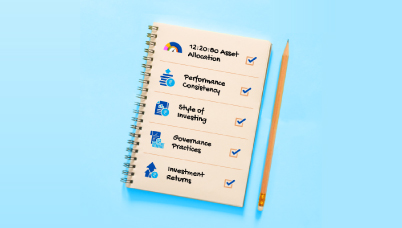Look at Inflation & Interest rates before Returns on Investment
Posted On Friday, Apr 21, 2017
In our previous articles we have discussed how to choose a fund house, a fund and various 'internal' factors affecting the returns on investment (internal to the fund house). Today, we talk about interest rates and inflation which are external factors and have valid and direct impact on returns on investment. Though there are many other external factors apart from these two, but inflation and interest rate could be 'silent killers' of the portfolio and therefore must be kept in mind while investing.
What is Inflation?
According to Investopedia, inflation is the rate at which the general level of prices for goods and services is rising and, consequently, the purchasing power of currency is falling. Central banks attempt to limit inflation (to manageable levels), in order to keep the economy running smoothly.
The rate of inflation is the most important factor as it decides the value of money. Most of the time we hear from our parents that they have managed the entire monthly household expenditure with Rs 500 and today Rs 500 is not sufficient to manage even a day's expenditure. What does inflation imply? It indicates that price of goods and commodities are rising significantly during the period which has brought down the value of money. The prices will keep rising. You must factor in this price rise while taking investment decisions. For example if you are able to buy X goods and services with Rs 100 today then tomorrow you may have to spend Rs 200 for the same quantity. In short, returns on investment must be higher than the inflation rate. You can refer to Table 1 which indicates the average inflation growth rate in India.
What is Interest Rate?
Interest rate is the amount charged, expressed as a percentage of principal, by a lender to a borrower for the use of assets. According to Investopedia anyway, in simpler words, investors invest money in anticipation to multiply the principal amount, the rate at which the principle amount multiples is called interest rate. This is the difference between stuffing cash into the mattress versus investing. Investing adds to your money. The additional amount added to the principle is interest, expressed as a % is the interest rate.
Interest Rate on Investment
There are many options available for investments like savings bank accounts, bank fixed deposits, post office saving schemes, mutual funds, bonds and debentures etc. The rate of returns is different from each of these options. Before you decide to invest your hard earned savings, do not merely consider rate of returns, but real rate of returns is the most important factor, which most investors are unaware of.
What is Real Rate of Returns?
Basically, inflation needs to be deducted from the returns on investment to get real returns. For example, if you have invested Rs 100 a year before and you get 8% returns (i.e. Rs 108), today however if inflation is at 9% during the period then you have reason to worry. You have earned an extra Rs 8 on investment, however; current inflation rate is 9% which is higher than your returns. This means that to purchase the same item in the coming year, you will be paying Rs. 109, your investments are at Rs. 108, which means you will have to sacrifice Re. 1 you're your principle amount. To conclude, investor should consider inflation rate prevailing into the economy before finalizing on an investment avenue.
Where should you invest to earn returns higher than inflation?
As mentioned earlier, there are various options available for the investments. Investments in fixed deposits are one of the most popular investment options in India. However investments in stock markets are also gaining popularity in recent years. We have drawn up a ready reckoner for you in the form of Table 1. Table 1 indicates inflation rate, growth rate of BSE Sensex Index and State Bank of India deposit rate for deposits kept for above 5 years. The average inflation in India is 6.69% for last 16 years (2000-2016). The index growth for the S&P BSE Sensex is 15.88% and SBI deposit rates (above 5 years) is seen at 7.71%. The numbers indicate the real value for money.
With reference to the table, stock market delivers negative returns (on few occasions) and sometimes SBI deposit rate is higher than inflation and BSE Sensex Index growth (for example see year 2002 in the table). However, the end of 16 years scenario is different. Hence, it is always advised that if you are planning to invest in the stock market via SIP (ideally for the long term), then you must be patient enough to achieve healthy returns. Thus across 16 years inflation levels and the returns from FD's are almost neck and neck. You need to invest in an option that gives returns that are comfortably higher than the inflation levels - an asset class like equity - which will not lead you to perspire when inflation increases.
Mutual fund managers (equity fund managers) invest in shares. The BSE Sensex is one of the key benchmark to access the performance of the funds. Most of the time returns on investment from funds could be 2-3% higher than the benchmark index. Returns are higher in equities compared to fixed deposits however; investors are requested to note that their principle amount and the interest rate are secure in fixed deposits than equities.
In short inflation and interest rates are important factors which impact returns on investment irrespective of the asset class in which you invest, be it the markets (Equity), FDs (Debt) or Gold. You will need to be very clear as to your financial goals and your risk appetite before you invest. Do consult your financial advisor before you decide to take the plunge into the world of investing.
Keep visiting Quantum Direct for future articles!
| Year | Consumer Price Index | S&P BSE Sensex (Index growth)% | SBI Deposit rates (Above 5 yrs.) |
|---|---|---|---|
| 2000 | 4.02% | -20.65 | 9.75 |
| 2001 | 3.77% | -17.87 | 8.25 |
| 2002 | 4.31% | 3.52 | 5.88 |
| 2003 | 3.81% | 72.89 | 5.88 |
| 2004 | 3.77% | 13.08 | 5.38 |
| 2005 | 4.25% | 42.33 | 6.25 |
| 2006 | 5.79% | 46.70 | 6.75 |
| 2007 | 6.39% | 47.15 | 8.13 |
| 2008 | 8.32% | -52.45 | 8.75 |
| 2009 | 10.83% | 81.03 | 8.13 |
| 2010 | 12.11% | 17.43 | 7.38 |
| 2011 | 8.87% | -24.64 | 8.63 |
| 2012 | 9.30% | 25.70 | 8.88 |
| 2013 | 10.92% | 8.98 | 8.75 |
| 2014 | 6.37% | 29.89 | 8.80 |
| 2015 | 5.88% | -5.03 | 8.38 |
| 2016 | 4.97% | 1.95 | 7.15 |
| Average % | 6.69 | 15.88 | 7.71 |
| **Past performance may or may not be sustained in the future. | |||
| Source: SBI rate- https://www.rbi.org.in/scripts/PublicationsView.aspx?id=12765 | |||
| SBI rate- https://www.rbi.org.in/scripts/PublicationsView.aspx?id=17207 | |||
| BSE Sensex - http://www.bseindia.com/indices/IndexArchiveData.aspx | |||
| CPI - https://dbie.rbi.org.in/DBIE/dbie.rbi?site=publications | |||
Disclaimer, Statutory Details & Risk Factors:
The views expressed here in this article are for general information and reading purpose only and do not constitute any guidelines and recommendations on any course of action to be followed by the reader. Quantum AMC / Quantum Mutual Fund is not guaranteeing / offering / communicating any indicative yield on investments made in the scheme(s). The views are not meant to serve as a professional guide / investment advice / intended to be an offer or solicitation for the purchase or sale of any financial product or instrument or mutual fund units for the reader. The article has been prepared on the basis of publicly available information, internally developed data and other sources believed to be reliable. Whilst no action has been solicited based upon the information provided herein, due care has been taken to ensure that the facts are accurate and views given are fair and reasonable as on date. Readers of this article should rely on information/data arising out of their own investigations and advised to seek independent professional advice and arrive at an informed decision before making any investments.
Mutual fund investments are subject to market risks read all scheme related documents carefully.
Please visit – www.QuantumMF.com to read scheme specific risk factors. Investors in the Scheme(s) are not being offered a guaranteed or assured rate of return and there can be no assurance that the schemes objective will be achieved and the NAV of the scheme(s) may go up and down depending upon the factors and forces affecting securities market. Investment in mutual fund units involves investment risk such as trading volumes, settlement risk, liquidity risk, default risk including possible loss of capital. Past performance of the sponsor / AMC / Mutual Fund does not indicate the future performance of the Scheme(s). Statutory Details: Quantum Mutual Fund (the Fund) has been constituted as a Trust under the Indian Trusts Act, 1882. Sponsor: Quantum Advisors Private Limited. (liability of Sponsor limited to Rs. 1,00,000/-) Trustee: Quantum Trustee Company Private Limited. Investment Manager: Quantum Asset Management Company Private Limited. The Sponsor, Trustee and Investment Manager are incorporated under the Companies Act, 1956.
Related Posts
-

Do You Need to Update Your KYC/Modify KYC?
Posted On Friday, Apr 26, 2024
New KYC Regulation Effective April 1st 2024
Read More -

Are You Stuck in the Past or Ready for a Secure Future?
Posted On Wednesday, Jun 29, 2022
The ever-growing number of mutual fund schemes on offer has made it challenging for investors to select the best and most suitable one.
Read More -

Received an Increment? Step-up Your SIPs
Posted On Wednesday, Jun 01, 2022
For instance, let’s assume that you have registered for a monthly SIP of Rs 5,000 for a 10-year period and later on try to step-up the SIP at an annual frequency, say by Rs 500. In the first year...
Read More



